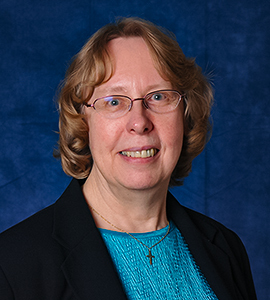

The Canadian Council of Churches at 80 | One Body
Sr. Donna Geernaert, SC
Thursday, August 24, 2023


The Canadian Council of Churches at 80
by Sr. Donna Geernaert, SC
In 2024, The Canadian Council of Churches (CCC) celebrates the 80th anniversary of its founding. Anniversaries are an opportunity to review the past and look to the future, to celebrate what has been accomplished and to learn from past experience, with a view to developing a clearer self- understanding in the present and identifying a vision for the future. A Brief History The council began in 1944 as 10 Christian churches sought to work together to fulfill their call to mission, service, religious education, and evangelism. Together their professed adherents represented more than 45 per cent of the Canadian population. At that time two of three Canadians were in a church on any normal Sunday – 60 per cent of Protestants and 80 per cent of Roman Catholics. The council was born during the Second World War, when people worldwide longed to find ways of cooperating. This period saw the drafting of the Charter of the United Nations and the founding of the World Council of Churches (WCC), in the planning stages from 1938 until its inaugural assembly in 1948. Canadian churches had already been cooperating themselves through bodies related to social service, religious education, evangelism, and overseas mission. In the 1950s and into the 1960s, the CCC was organized with full departments of ecumenical affairs, evangelism, social relations, overseas mission and Christian education as well as many committees. Criticisms arose, from the United Church of Canada among others, suggesting the council was not only too compartmentalized but was duplicating the work of individual churches. By the mid-60s, the council was busy examining its purpose, reorganizing itself and writing a new Constitution. Within a few years, instead of coordinating or reflecting the departmental activities of the churches, the council started to consider its focus to be the nature and nurture of ecumenical encounter and action amongst churches. Vatican II and the CCCB In the late 1960s, the Second Vatican Council gave impetus to official Catholic participation in the ecumenical movement. The Canadian Conference of Catholic Bishops (CCCB) quickly expressed this impetus by joining other Canadian churches in forming a number of social justice coalitions. Addressing a wide variety of issues from human rights, to poverty, corporate responsibility, and disarmament, the work of these coalitions has been internationally recognized as an excellent example of how churches can address societal concerns together. Encouraged by ecumenical experience in the coalitions, the CCCB began to explore closer relations with the CCC, becoming an associate member in 1985 and a full member in 1997. They weren’t alone: many bishops’ conferences around the world were also in the process of developing local ecumenical relationships and becoming full members of the national council of churches (NCC) in their respective countries. This has been a growing trend, as membership of bishops’ conferences in NCCs increased from 11 in 1971 to 82 in 2003. Since there is no ecumenism without a change of heart, prayer has been integral to the CCC agenda from its earliest days. When the WCC and the Vatican began to cooperate in preparing materials for the Week of Prayer for Christian Unity (WPCU) in 1966, the CCC quickly took up the task of promoting prayer for Christian unity throughout the country. Beginning in 1968, materials to be used during the Week of Prayer in Canada have been jointly prepared by an ecumenical committee which meets annually to assess responses to the current year’s text and plan for next year’s celebration. In 1987, this CCC committee was invited by the WCC to prepare the initial draft of the prayer materials to be used worldwide. In 2014, the Prairie Centre for Ecumenism and the Canadian Centre for Ecumenism collaborated in drafting the initial WPCU text. The CCC now truthfully describes itself as “a broad itself as an inclusive ecumenical body with 26 member churches including Anglican, Eastern and Roman Catholic, Evangelical, Free Church, Eastern and Oriental Orthodox, and Historic Protestant traditions representing 85% of the Canadian population. A Clearer Sense of Identity The WCC and CCC use the phrases “fellowship of churches” and “community of churches” as the basis of their constitutions, respectively. These phrases highlight the fundamental importance of relationships in ecumenical life. In fact, “fellowship” is sometimes used to translate the Greek term koinonia which has been central to many recent ecumenical dialogues about the church and its unity. However, the relationship among churches in a council is not yet koinonia in a full sense. Various authors have noted that the use of the word “council” in English lacks the clarity of meaning which is expressed with two different words in many other languages. In French, for example, a representative gathering of an undivided church is a concile, and a provisional fellowship of yet divided churches is a conseil. The CCC is clearly not a concile, which is able to make decisions on behalf of its member churches or dioceses, as in an Ecumenical Council of the Catholic Church, or a General Synod of an Anglican or Protestant Church. A body like the Canadian Council of Churches (le Conseil canadien des Églises - note the word conseil rather than concile) is always challenged to give careful consideration to its relationship with the churches who are its members. In Canada, this matter was already being raised in the 1960s, and the prospect of CCCB membership in the 1980s gave new impetus to the discussion. With its strong sense of identity and universality, the Catholic Church tends to link membership in an NCC to a form of ecumenism which is rooted in the unique identify of the churches themselves as dialogue partners. This approach to conciliar ecumenism met with a receptive environment as many NCCs around the world were in the process of reorganizing structures to highlight their member churches’ ownership of and responsibility for agenda and projects. Where most NCCs initially used a parliamentary, majority vote method for making decisions, many have now moved towards decision-making by discernment and consensus as a better way to promote communion among their members. A similar insight into the relationship between a NCC and its member churches is articulated in Article IV of the CCC’s revised Constitution, which envisions the council as a “forum.” The Article clarifies that “responsibility for all positions and views, doctrines, calls for action and decision to act, shall rest with the individual churches who have joined in any given dialogue." In the forum model, “The Council acts as coordinator of churches wishing to work together, enabling member churches to act together, or where there is unanimity to delegate the Council to act on their behalf” (CCC Bylaws, II.2). Discussions of the CCC’s Governing Board clarified that a “forum” provides an opportunity for churches to meet as churches to decide together on common agenda. It serves as a clearing house for churches to exchange views on those issues of fundamental importance to them, to see on what grounds they can cooperate and whether any common action is possible. Each member church has an equal voice, speaking its own truth from its own mind. Because of this equality, member churches also have an obligation to listen, in a dialogue spirit, to the voices of other churches; forum is a learning and discerning opportunity. The hope and goal of the forum is to find a consensus among the churches, which then enables common action on the issue at hand. When consensus is not possible, member churches may opt into smaller multi-church fora for common action, but such action shall not be in the name of the CCC. The assumption is that the concerns of the CCC will normally originate with the member churches but since the council is part of the wider Body of Christ, agenda items may also arise from other sources. The forum model provides a method by which churches can work together in Christian unity while remaining faithful to their respective traditions. Since its adoption in 1996, it has stimulated a widening of the ecumenical circle with the inclusion of new member churches. Adoption of the forum model has brought a new sense of identity to the CCC. It has energized ecumenical commitment and highlighted awareness of a valuable contribution the CCC is able to offer to other conciliar bodies involved in the search for Christian unity. Yet, questions continue to be raised about the effectiveness of the model, and there is ongoing conversation about the forum model at both the CCC Executive Committee and Governing Board. Most recently this conversation has been enhanced by Roman Catholic presentations on the upcoming Synod on Synodality. In this context, participants at the May 2022 Governing Board meeting found a number of similarities in the two processes and suggested that forum is the way divided churches in Canada can live out synodality, walking together toward greater unity in Christ. Looking to the Future In 1985, the CCCB outlined its reasons for seeking associate membership in the CCC. In brief, the bishops maintained that membership in a council of churches makes the Catholic commitment to ecumenism more clearly visible. While ecumenical cooperation in specific projects can be very effective, council membership witnesses specifically to the search for Christian unity itself. Further, membership provides a forum for sustained attention to the churches’ growth in unity, and for dialogue on questions of Gospel and culture, evangelization, and ethical issues, as well as on matters which divide the churches. It gives the churches a common voice to fulfil the prophetic function of Christian discipleship and enables them to act together more effectively on social justice issues both locally and internationally. Yet, the relationship of churches in a council is more than simple affiliation. In spite of their divisions, churches when united in a council seek to enter into living contact with the other members. This vocation to go beyond mere affiliation was the experience of the Council of Churches for Britain and Ireland (CCBI). During their own process of growth and renewal, they recommended that the churches move, to quote Cardinal Basil Hume, “quite deliberately from a situation of cooperation to one of commitment to each other." Councils of churches are not simply to be regarded as associations founded on mutual good will – cooperation – as good as that may be – but are the fruit of the Spirit which keeps the churches in the initial dynamic of baptism and stirs up a commitment to each other as members one of another, united in baptism. A sustained reflection on the lessons of the CCBI's own history is for another article, but for now here are some theological lines that could move all Christians in that direction. Sharing in one baptism and the confession of Jesus Christ as Lord and Saviour, the member churches experience a real, even though imperfect communion (koinonia) with one another. As affirmed in international bilateral dialogues, the search for unity among Christians is so that the church may be a more credible sign, instrument and foretaste of God’s purpose to “unite all things with Christ as head” (Colossians 1:19). As ARCIC II affirmed, “Only a reconciled and reconciling community in which human divisions are being overcome, can speak with integrity to an alienated, divided world, and so be a credible witness to God’s saving action in Christ and a foretaste of the coming reign of God.” (Salvation and the Church, #30). “Concern for the unity of all humankind is the only proper context for the quest for church unity” (Anglican-Reformed International Commission, God’s Reign and our Unity, #18, see also #34). Yet, a focus on Christian unity in no way diminishes a council’s commitment to addressing injustices in contemporary society. As they are called to serve God’s work of reconciliation, “Christians will be active in the promotion of justice, liberation of the oppressed, peace and the protection of the environment.” (International Reformed-Catholic Dialogue, The Church as Community of Common Witness to the Kingdom of God, #65). The CCC at 80 lives in a very different social/cultural context than the one it entered in 1944. According to the 2021 Statistics Canada report, 53.3% of Canadians identify themselves as Christian, 16% say they have no religion and approximately 3% claim membership in other faith traditions. Changing approaches to moral questions have raised new and often divisive issues within and among the churches. The political context is becoming increasingly polarized with concepts of fake news and conspiracy theories influencing public debate. International cooperation can no longer be taken for granted as nations around the world seem ever more willing to seek to resolve disputes through military conflict rather than negotiation. In this changing context, the CCC faces specific challenges, especially with regard to a growing tendency among Canadian Christians to prioritize interfaith over ecumenical relations, and the churches’ diminishing ability to meet the Council’s financial needs. Still, the CCC’s witness to the search for Christian unity may have a distinctive role to play both nationally and internationally. The forum model, with its focus on building consensus and giving equal voice to every member church, offers a clear counter-cultural witness in today’s world. Looking to the future, the forum model might be enhanced with some reflection on the CCBI experience. Specifically, its recommendation that the churches should move “from a situation of cooperation to one of commitment to each other” poses an interesting challenge for Canada’s NCC. What would this look like for the CCC? What needs to change to bring this about? Sr. Dr. Donna Geernaert, SC, served for 18 years in promoting ecumenical and interfaith relations for the Canadian Conference of Catholic Bishops. She has been a staff member, consultant, and member of numerous multilateral and bilateral theological dialogues in Canada as well as internationally.
Sr. Dr. Donna Geernaert, SC, served for 18 years in promoting ecumenical and interfaith relations for the Canadian Conference of Catholic Bishops. She has been a staff member, consultant, and member of numerous multilateral and bilateral theological dialogues in Canada as well as internationally.
Related Articles:
Category: Canada, Ecumenism
Tag: Canadian Council of Churches, ecumenism, One Body
God in the City: Catholic Journalism Summer Intensive 2025
Monday, March 31, 2025
 Salt + Light Media
Salt + Light Media
Canadian Catholic News is offering an in-person intensive experience of its popular online course, “Telling Truth in Charity: Introduction to Catholic Journalism” this summer.
What does the 500th anniversary of the start of the Anabaptist movement mean for the unity of the church? | One Body
Tuesday, March 25, 2025
 Jeremy Bergen
Jeremy Bergen
Jeremy Bergen reflects on the origins and history of the Anabaptist movement and its implications for ecumenical dialogue.
Dominican Friars Youth Interfaith Video Contest 2025
Thursday, March 13, 2025
 Salt + Light Media
Salt + Light Media
The Office for Interreligious Dialogue and the Dominican Friars of Toronto invite students in grades 9-12 to participate in the 2025 Youth Interfaith Video Contest.
A House Not Made With Hands: St. Anne’s Anglican Church
Friday, February 21, 2025
 Scott Harris
Scott Harris
In June, 2024, the domed roof and interior of St. Anne's Anglican Church in Toronto tragically burned down. However, the parish community continues to stand strong and serve its neighbourhood.
Nostra Aetate at 60: Spotlight on Interreligious Relations | One Body
Saturday, February 15, 2025
 Julien Hammond
Julien Hammond
Julien Hammond looks back on the history of Catholic interreligious dialogue in the six decades since Vatican II's landmark Declaration.
SUPPORT LABEL
$50
$100
$150
$250
OTHER AMOUNT
DONATE










